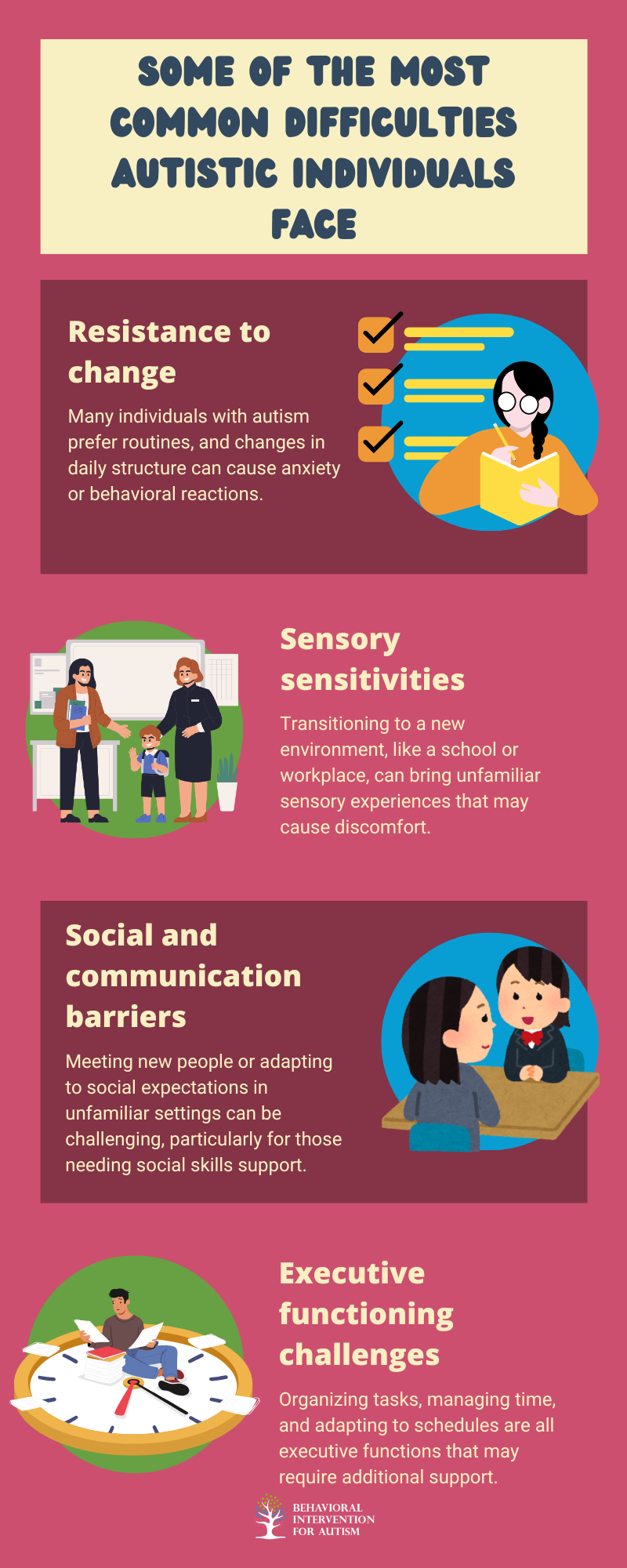
Table of Contents
Transitions are significant moments in everyone’s life, but for individuals on the autism spectrum, transitions can present unique challenges. Whether it’s moving from school to work, from one school grade to the next, or simply adjusting to new routines, each phase requires thoughtful planning and support. This article explores autism transition tips across all stages of life, covering strategies that help individuals with autism navigate these changes with confidence and success.
Understanding Transition Challenges for Individuals with Autism
Transitions can be overwhelming for people with autism due to sensory sensitivities, reliance on routines, and potential challenges with social communication. Recognizing these challenges early allows parents, educators, and caregivers to develop personalized support plans tailored to the individual’s needs. Here are some of the most common difficulties faced:

Understanding these challenges forms the foundation for implementing effective transition strategies tailored to the individual.
Early Childhood Transitions: Preparing for Preschool and Kindergarten
Tips for Preparing for Early Schooling
Starting preschool or kindergarten is a critical step for young children with autism. Here are some tips to help make the transition to early schooling smoother:
- Create a visual schedule: Use pictures, symbols, or written steps to illustrate the day’s routine, giving the child a clear idea of what to expect.
- Visit the school beforehand: Arrange a few visits to the classroom and playground so the child can explore the environment and meet teachers and aides.
- Establish a consistent morning routine: This helps the child become familiar with the daily process of getting ready, easing potential morning stress.
- Practice separation: If separation anxiety is a concern, practice short separations and gradually increase the time to help your child become comfortable with being away from caregivers.
- Collaborate with the school team: Maintain communication with teachers and special education staff to share information about your child’s needs, strengths, and any specific sensory accommodations.
Early Childhood Transition Support Strategies
At this stage, incorporating play-based learning activities and social skill development is essential. Focus on teaching basic social interactions, helping your child learn to recognize and understand emotions, and using sensory tools as needed for self-regulation. Collaborate with occupational therapists (OTs) and speech-language pathologists (SLPs) who can support these early skills and help prepare for future transitions.

Elementary to Middle School Transitions
As children move from elementary to middle school, they may face increased academic demands and a more complex social environment. This transition phase may require adjustments in organizational skills, self-advocacy, and peer relationships.
Academic and Social Skills Preparation
- Teach self-advocacy: Encourage your child to ask for help when needed, such as requesting a break or asking for clarification on assignments.
- Practice organizational skills: Use checklists, planners, or apps to help with tracking assignments and other responsibilities. This can ease the transition to middle school, where students often need to manage multiple subjects.
- Encourage peer connections: Set up structured social activities like small group projects or extracurriculars that allow your child to practice social skills in a low-pressure environment.
Setting Up Supports
Middle school often introduces new support staff and teaching styles, so plan to attend individualized education program (IEP) meetings to coordinate goals. Transitioning to middle school may also require additional accommodations, such as access to a quieter area or modified seating arrangements.

High School Transition Planning
High school introduces complex social dynamics, increased independence, and the need to think about future education, employment, or independent living. Preparing for this stage requires addressing both academic and life skills to support a well-rounded transition.
Life Skills Development
Life skills are essential for independence and successful adulthood. In high school, focusing on the following skills can greatly ease the transition:
- Time management and organization: Provide tools like planners, alarms, or apps to help your child track classes, assignments, and deadlines.
- Financial literacy: Begin teaching basic budgeting, spending, and saving skills. This can include practicing grocery shopping or managing a small allowance.
- Social and self-advocacy skills: Encourage open communication with teachers and peers about support needs. Practicing assertiveness and self-advocacy is crucial as students move into adulthood.
Career and Vocational Skills
Help your child explore career interests and gain work experience through volunteer or paid opportunities. High schools often offer vocational training programs or internships that provide on-the-job skills and career exploration. The school’s guidance counselor and transition team can help identify resources that align with your child’s strengths and interests.

Transitioning to Adulthood: College, Employment, and Independent Living
For many individuals with autism, the transition to adulthood is a significant shift. Whether it’s attending college, starting a job, or living independently, each step presents unique challenges.
Tips for Transitioning to College
- Choose a supportive environment: Research colleges with programs designed for neurodiverse students, such as academic coaching, sensory-friendly spaces, and social support groups.
- Establish accommodations: Register with the college’s disability services office to secure academic accommodations, such as extended test times or note-taking support.
- Practice self-care routines: Moving away from home often introduces new challenges in self-care, so practicing routines like cooking, laundry, and scheduling downtime can ease this transition.
Tips for Transitioning to Employment
Employment is an important step for many adults with autism. To prepare for the workplace:
- Practice job-related social skills: Role-play interview scenarios and workplace social situations to build confidence.
- Use visual supports: Visual aids or written checklists can help with task management on the job.
- Explore workplace accommodations: These may include flexible schedules, modified workspaces, or extra support from mentors or job coaches.
- Connect with job training programs: Organizations and vocational rehabilitation programs are available to support autistic individuals in finding and maintaining employment.
Tips for Independent Living
For some individuals, independent living is the ultimate goal. Here are some ways to support this transition:
- Build daily living skills: Practice skills like budgeting, grocery shopping, personal hygiene, and home organization.
- Create a support network: Having access to a network of friends, family, or mentors can provide support during challenging times.
- Establish routines for household management: Use calendars, alarms, and checklists to assist with household tasks like bill payments, cleaning, and meal preparation.
Transitioning to Social and Community Involvement
Social interaction is a key component of a fulfilling life, and involvement in community activities can foster connections, personal growth, and a sense of belonging.
Tips for Social Transitions
- Encourage community activities: Look for autism-friendly events, social groups, or recreational clubs that align with the individual’s interests.
- Practice social boundaries: Teach clear boundaries and safe social practices, especially if transitioning into a new community or setting.
- Work on empathy and reciprocity skills: Understanding how to engage in reciprocal conversations can help individuals connect with others.
Maintaining a Support Network
Transitioning to new social groups or environments doesn’t mean leaving behind familiar support. Stay in touch with friends, family, and any previous mentors who can offer guidance and encouragement. Building a well-rounded social network provides emotional support and helps with adapting to changes in life.

Dealing with Unexpected Transitions and Life Changes
Life events like family changes, moving, or health issues can introduce unexpected transitions. Preparing for these moments is crucial for maintaining stability.
Tips for Managing Unexpected Transitions
- Prepare for changes in advance when possible: For events like moving, talk about the change early on, show pictures of the new environment, and establish new routines.
- Build resilience through flexibility: Practice adjusting routines on occasion to help the individual become comfortable with changes.
- Encourage emotional expression: Create a safe space for discussing emotions, helping the individual express any feelings related to change.
Transitioning through various life stages is a journey that each person with autism experiences uniquely. With thoughtful preparation, individualized support, and an emphasis on building skills and confidence, individuals with autism can navigate these changes more smoothly. From early childhood to adulthood, every stage offers an opportunity to grow, learn, and thrive with the right guidance and encouragement.
Ready to Make a Smooth Transition?
Transitioning can be a challenging time for individuals with autism, but with the right support and strategies, it can also be a positive experience. Setting clear goals, maintaining consistent routines, and providing visual aids can greatly assist in easing the process. We focus on personalized approaches that cater to each individual’s unique needs, ensuring they feel secure and understood throughout the transition.
Behavioral Intervention For Autism offers comprehensive ABA therapy in Florida, designed to empower individuals and enhance their coping skills during these significant changes. Our dedicated team is committed to delivering high-quality, evidence-based interventions that truly make a difference. If you’re looking for guidance or want to learn more about our services, connect with us today!
- 9 Common Obsessions of Children With Autism You Should Know - February 25, 2025
- What is Neurodiversity? A Guide to Embracing Differences - February 25, 2025
- Understanding Hyperfocus in Autism: What It Means and Why It Happens - February 25, 2025
